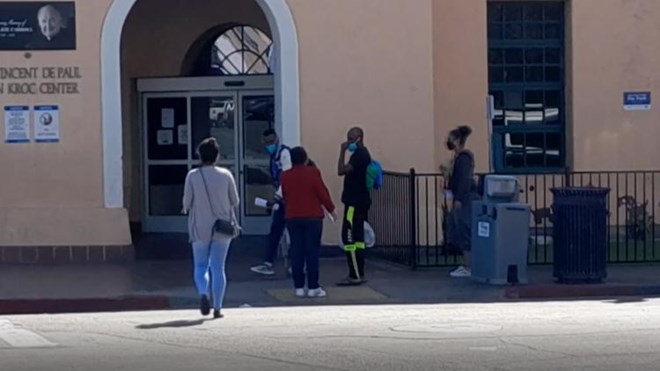
Author: Dorian Hargrove, Keristen Holmes
Saturday September 17, 2022
Somali refugees were staying at a migrant program run by Catholic Charities but failed to have sponsors, leaving them on the street.

Credit: Michael McConnell
SAN DIEGO — A new video shows workers from Catholic Charities dropping off two Somali refugees at downtown homeless shelters, barely able to speak English, with no money, and no idea how to navigate life on the streets or the immigration system.
Faud and Omer, both asylum seekers from Somalia, say they crossed the border in hopes of escaping the violence in Eastern Africa.
The two, who did not know each other before, wound up at a migrant shelter inside the Crown Plaza hotel in Mission Valley that is run by Catholic Charities.
On Thursday, September 16, their stay at the hotel came to an end, as a Catholic Charities worker informed them that their time was up and that they had to move to another shelter. The men say they had no idea that their new temporary home would be a homeless shelter at Father Joe's Villages.
This video shows the refugees arriving at the shelter, with all of their belongings; those being the clothes they were wearing.Faud, 38, says he was injured after jumping over the border wall and spent the next day in the hospital.
"The police take me to the hospital and then the hospital sends me to the immigration shelter. Then, as of yesterday, I am now outside in the street," Faud told CBS 8 in a September 16 interview.
Homeless advocate Michael McConnell happened to be outside the shelter when he noticed the white passenger van from Catholic Charities park and escort Faud and Omer into the shelter. McConnell waited until he saw them come back outside.
"The homeless shelter system can't even take care of homeless people on the streets," said McConnell. "No way are they equipped to deal with the needs of migrants who are seeking asylum in our country, they need legal help, they need a lot of additional things that the homeless shelter system isn't capable of."
McConnell agreed to help put Faud and Omer into a hotel and find resources for them so they do not have to live on the streets, in a country they are unfamiliar with, without money, unable to speak the language, nor know how to access any resources.
"He helped me and he gave me everything," Faud said. "But before yesterday. I'm in a homeless place on the street and I'm not well."
Omer, who crossed the border on August 29, said he was surprised when he was taken to the homeless shelter.
"I'm not homeless. I need help," said 26-year-old Omer. "I want to make life here, I want to have [a] safe life. I want to bring my mom, my younger brother so they have opportunity."
Meanwhile, McConnell said he has been working to find a place for the men to stay and help them to navigate the immigration system. He has also set up a GoFundMe drive to help them do that.
"I'm working with local activists to bring awareness about this to get it to stop," said McConnell. "If we need to increase the shelter system to include migrants that are coming in, that's great, let's do that. But they have to be helped. We already have thousands of folks living on our streets. It's not fair to anybody to keep dumping more people onto our streets, especially ones who are here from another country, they're not even familiar with."
Kevin Eckerty, the spokesperson for the Catholic Diocese in San Diego, says state funding only pays for 30-days of shelter. Most of the time, says Eckerty, that is enough time to arrange the refugees with their sponsors or family members who already live in the U.S. For those, however, without sponsors or family here, that process is more difficult.
"The situation seems to boil down to the persons involved getting 'timed-out' of the program," said Eckerty. "Most persons who enter the USA through the asylum program enter, are processed by ICE, catch their breath, receive some medical care, and move on to stay with family, friends, or some other sponsor."
Added Eckerty, "The federal/state-funded program provides for 30-days of support. In this case, Catholic Charities extended that for another 30-days. At the end of the sixty days they were required to leave the government-supported housing, but having nowhere else to go, the men were given shelter at Father Joe’s Villages. They weren’t turned out onto the street and they would continue to receive support."
Meanwhile, McConnell says he is confident that Faud and Omer are not alone and that many other refugees are likely either in homeless shelters or are already out on the street.
Neither, says McConnell, is fair.
"We have homeless people who are lined up to get into shelters. We have asylum seekers lined up trying to get help. It's not fair to either group. We have to help folks with the needs that they have. As for the asylum seekers, they want to get jobs, they want to take care of themselves, and they want to help others. This is what America was built on."